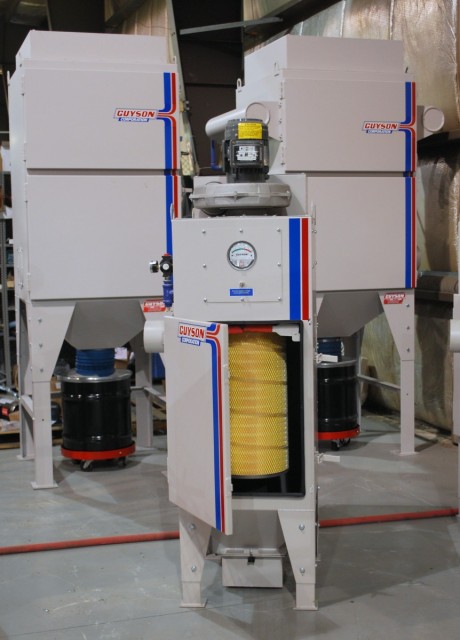Inefficient operation of the dust collector greatly affects performance of the cyclone reclaimer, media delivery system and blast cabinet. Inadequate maintenance can also have an impact on air quality and cleanliness of the surrounding environment.
Failure to perform routine maintenance including removal of dust build-up and waste not only affects performance but depending on your application/process, can increase your risk of fire.
A fire and/or explosion potential may exist in some applications due to the chemical make-up of the residue of the parts being blasted and the blasting media dust.
On September 7, 2015 the NFPA 652 Standard on the Fundamentals of Combustible Dust 2016 Edition became effective and brought with it new standards for dust collection.
How the new standard affects you:
The new standard includes several new directives and should be reviewed in detail to know for sure how it affects you. One thing it does do is place more responsibility on the owner/operator of a facility that utilizes dust collection equipment. It is the end user’s responsibility to determine if their process and/or dust created is combustible or hazardous and the new standard now requires any facility that does generate combustible dust to have a DHA or Dust Hazard Analysis completed and documented (ref. NFPA 652 7.1.2.2).
How to determine if your dust is combustible:
A DHA or Dust Hazard Analysis identifies your applications specific risk level and must be completed by a qualified person/company in accordance with the guidelines of NFPA 652. The Guyson Corporation can assist with locating a third party to perform your dust analysis.
What if your dust is found to be hazardous?
With proper maintenance and operation of your blast system and correct handling and disposal of waste, your risk of fire is significantly decreased. For those with high risk applications, Guyson offers fire suppression systems, deflag vents and other options for both new and existing equipment that are designed specifically for your process.
As The Guyson Corporation of U.S.A. has no control over the parts or products treated by the blast process, we cannot give advice regarding special disposal requirements caused by the residue from your materials. Always check with your local and national code for instructions on how to handle disposal of waste.
The risk of fire caused by blasting materials may be significantly reduced by following these guidelines:
- Use only genuine Guyson Corporation of U.S.A. brand filters and change them frequently and/or as needed.
- Clean dust accumulation inside the dust collector frequently or as needed. General practice is to clean out the collector when dust build-up exceeds 1” and/or each time the filters are changed (whichever occurs first).
- Good general housekeeping, clean up all spilled media and machine waste immediately.
- Empty waste containers daily or more frequently as required. In some cases dilution with dry sand, 3 parts sand to 1 part waste or as determined by experimentation, is recommended by the NFPA.
- Avoid creating a dust cloud when emptying waste containers.
- Supply only clean, dry air to both the blast cabinet and the dust collector. Moisture reacting with the waste material is a known cause of fires.
- Maintain a good electrical ground on the entire system to discharge static electricity build-up.
- Avoid contamination of the system with unknown materials.
- Parts being blasted must be oil free and
- Do not attempt to clean dust collector cartridges by vacuuming, tapping, or blowing off with compressed air. Doing so can damage the filter, the filters nanofibers and further embeds particles into the filter greatly reducing efficiency.
- Proper maintenance to keep the system in peak operating condition, as detailed in the owner’s manual.
- Ensure adequate safety precautions when performing welding, grinding, vacuuming, or other static or spark producing operations in or near the equipment.
Refer to your user manual and/or contact Guyson Customer Service for detailed maintenance instructions for your specific machine
For a complete list of NFPA codes and access to all NFPA standards visit http://www.nfpa.org
To order new filters click here



